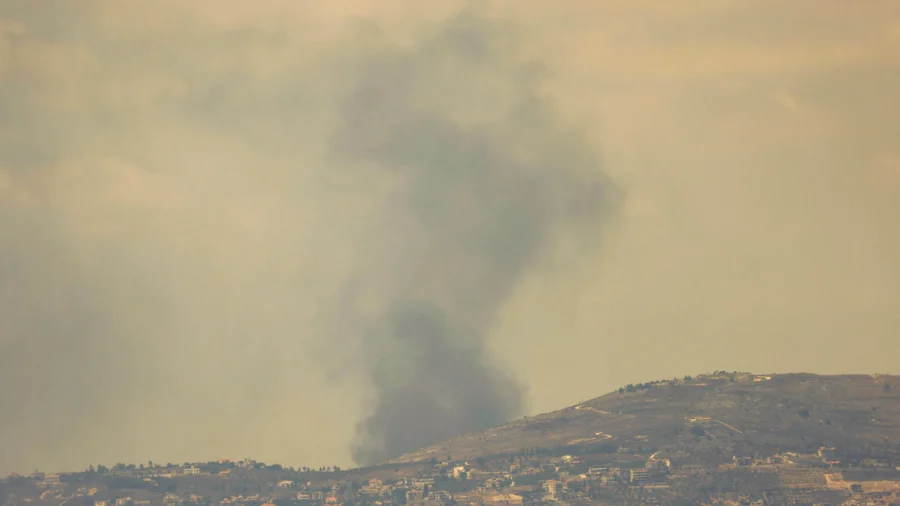Multiple countries including the United States, the UK, France, Italy, Sweden, and Jordan have advised their citizens to leave Lebanon amid escalating tensions between Israel and Lebanon-based Hezbollah.
Tensions have soared following the killing of Ismail Haniyeh, leader of the Palestinian terrorist group Hamas, in Tehran on Wednesday, a day after an Israeli strike in Beirut killed Fuad Shukr, a top commander from the Hezbollah terrorist group.
On Saturday, the U.S. Embassy in Lebanon issued a statement urging American citizens to leave Lebanon on “any ticket available.” The U.S. Embassy also advised U.S. citizens who do not plan to leave Lebanon to prepare contingency plans for emergencies and be ready for extended-term shelter locally.
On the same day, the British foreign office published a statement urging British citizens to leave Lebanon immediately when commercial transportation is still operational. British Foreign Secretary David Lammy said that the current regional situation is highly tense and could rapidly deteriorate, explicitly requiring British citizens to “leave now. ”
France and Italy on Sunday urged their citizens in Lebanon to leave the country due to the risk of military escalation in the Middle East, their foreign ministries said.
In two separate travel advisories, the French foreign ministry recommended citizens residing in Iran to temporarily leave the country given the risk of its airspace being closed. The ministry had urged citizens traveling in Iran to leave on Friday.
The ministry called on its citizens in Lebanon, especially those on trips there, to take advantage of the fact that there are still commercial flights available to leave.
Italy’s Foreign Minister Antonio Tajani on X urged Italians temporarily in Lebanon not to travel at all to the south of the country and to return to Italy as soon as possible by commercial flights, “given the deteriorating situation.”
“We also call on Italian tourists not to travel to Lebanon,” he added.
French Foreign Minister Stephane Sejourne and U.S. Secretary of State Antony Blinken shared their concern over rising frictions in the Middle East in a phone call on Saturday.
Swedish Foreign Minister Tobias Billstrom said on Saturday that due to escalating tensions between Israel and Hezbollah, the Swedish Foreign Ministry has decided to temporarily close its embassy in Beirut and withdraw diplomatic personnel. This temporary decision will be implemented for one month initially, with extensions possible depending on Lebanon’s security situation. Billstrom also urged all Swedish citizens in Lebanon to “leave the country by whichever means possible, while they still can.”
Also on the day, the Jordanian Ministry of Foreign Affairs and Expatriates issued a notice urging Jordanian citizens not to travel to Lebanon temporarily and requesting Jordanian citizens in Lebanon to evacuate promptly. The notice indicated that this recommendation is a precautionary measure in anticipation of potential changes in the regional situation. The notice also advised Jordanian citizens in Lebanon to maintain the highest level of vigilance and comply with directives issued by Lebanese authorities.
Iran’s state news agency (IRNA) reported that the Foreign Minister of Jordan will make a rare visit to the Iranian capital Tehran on Sunday, to “meet and exchange views with Iranian officials regarding bilateral, regional, and international issues.”
Airlines including Air France, Lufthansa, and Kuwaiti Airlines have already canceled flights to and from Lebanon while others diverted flights away from the country.
Air France said on Saturday it and its affiliate Transavia were further extending their suspensions of flights between Paris and Beirut until at least Aug. 6.
In a further sign of the region bracing for an Iranian retaliation, the United States on Saturday sent a carrier strike group, a fighter squadron, and additional warships to the Middle East. It marked perhaps the largest movement of U.S. forces to the region since the early days of the Gaza war, when the Pentagon sent two carrier strike groups toward the Middle East in a very public warning to regional terrorist groups not to expand the fighting.
Israel says it is ready for a “range of scenarios” following the killing of Haniyeh in Iran.
Israelis have been stocking up on supplies, while a file from the Jerusalem municipality advised residents to “clean and prepare their bomb shelters,” warning they must be able to reach shelters in 90 seconds.
Reuters and The CNN Wire contributed to this report.

